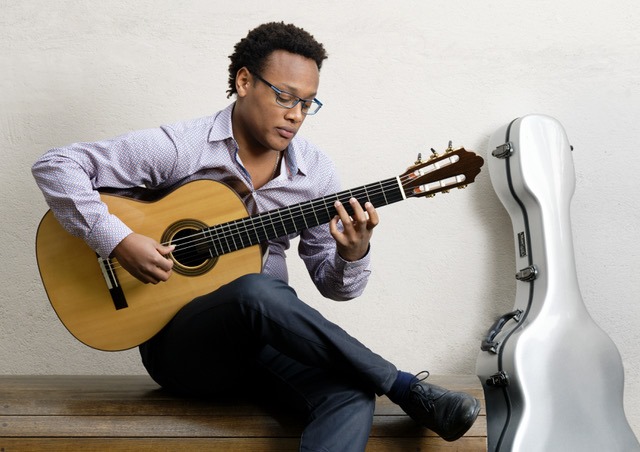by Jarrett Hoffman

It was March of this year, and guitarist Raphaël Feuillâtre had a week off in LA as he neared the end of what was supposed to be a 7-month, 50-city tour of the U.S. and Canada — a prize for winning the Guitar Foundation of America International Concert Artist Competition in 2018.
But the outbreak of the novel coronavirus in the U.S. was getting serious. In the end, the last fifteen dates of the tour were cancelled. Fortunately for us, Feuillâtre had already made his stop in Northeast Ohio — a visit to the Cleveland Classical Guitar Society’s International Series in October 2019 that marked his Cleveland debut.
All of that puts Feuillâtre’s return to the Guitar Society — a pre-recorded recital from his home in France which airs on YouTube on Saturday, November 21 at 7:30 pm — in a different perspective.
I reached the guitarist by email to talk about the last memories from his tour, coming out of lockdown and going back in, filming his concert, and choosing his program, which includes works by Bach, Weiss, Sérgio Assad, Villa-Lobos, Scriabin, Rachmaninoff, and Roland Dyens. (Click here to see the full list of repertoire, and here to RSVP and to receive the link to the concert.)
Jarrett Hoffman: What happened after your week off in Los Angeles?
Raphaël Feuillâtre: I gave two more concerts, and my last stop (non-performing) was Chicago. I took advantage of this time to visit Sérgio Assad, who kindly welcomed me at his home to work on his piece Aquarelle, which I’d been playing the whole tour. Then I had to wait a few long days, thinking of an eventual return home. But actually, when the GFA tour manager announced that I had to go back, I really had to do it as soon as possible.
JH: Over the past few months, you were able to give concerts and teach at festivals in person in France, but now the country is in another lockdown. That’s different from the U.S., where we’ve been in bad shape with the virus mostly continuously. Was it nice to have those normal experiences again, if only for a short time, or has it been difficult to go back and forth in what you’re able to do?
RF: Actually both — nice and difficult. Of course, after having worked hard during the first lockdown without knowing when I would be able to perform again, it has been an intense pleasure to go back onstage and to teach. But as I perform mostly outside of France, the situations of other countries affect my artistic activity anyway.
JH: What has been your experience with practicing when you have no scheduled performances?
RF: In a way it’s easier to work up pieces, but harder to reach a concert version, so I felt lucky to have had the GFA tour experience that helped me reach that goal.
JH: Let’s talk about the concert you’ll be giving online for the Cleveland Classical Guitar Society. First, will it be pre-recorded?
RF: Yes, and filmed by Armen Doneyan, who makes beautiful videos. It’s really challenging for me, especially because there is no end to this process. It’s an interesting experience that makes me think about the impact of the audience on my playing, or better said, the impact of my reactions in front of an audience on my playing.
JH: Your program includes arrangements by some of your former teachers as well as your new colleague Antoine Fougeray at the CRR de Rueil-Malmaison, where you’ve just recently started teaching. What is it like to play these works that in some way originated from people in your own life?
RF: At the beginning it was more a choice of repertoire than of arranger, and then I found those arrangements to be better than others. I think that to make an arrangement, you need to understand the piece deeply, so it’s easier for me to play an arrangement by someone I really trust and with whom I can discuss it. For Antoine Fougeray’s arrangements, he is running a publishing house, so it’s also a way to help him develop his work, which I really appreciate for many reasons — the most important being that there is a form of integrity in it, making it a really good way to develop the guitar repertoire. Of course, I still have it in mind to do my own arrangements as well.
JH: Near the end of the program, you’ll play a set of three preludes by Villa-Lobos, Scriabin, and Rachmaninoff that you also included on your second album last year. What do you find compelling about that set?
RF: The pieces themselves are compelling actually, I just try not to make them sound the opposite, which requires some intense work and allows me to develop certain techniques.
JH: Dyens’ “Clown Down” from Triaela is a really fun way to end, with some very wild sounds. How would you describe what people will hear in that movement?
RF: Well, it’s hard to know what people hear exactly, but I would say Afro-Brazilian rhythms, tapping. And as the subtitle is “Gismonti at the circus,” I would say lions roaring and a lot of unusual things for classical guitarists that people could interpret as they wish.
Published on ClevelandClassical.com November 17, 2020.
Click here for a printable copy of this article


